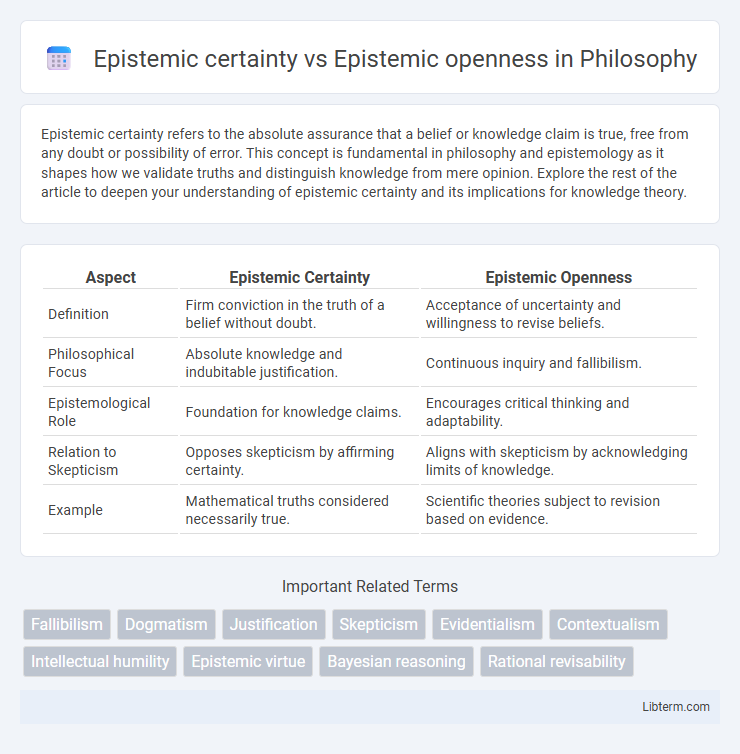Epistemic certainty refers to the absolute assurance that a belief or knowledge claim is true, free from any doubt or possibility of error. This concept is fundamental in philosophy and epistemology as it shapes how we validate truths and distinguish knowledge from mere opinion. Explore the rest of the article to deepen your understanding of epistemic certainty and its implications for knowledge theory.
Table of Comparison
| Aspect | Epistemic Certainty | Epistemic Openness |
|---|---|---|
| Definition | Firm conviction in the truth of a belief without doubt. | Acceptance of uncertainty and willingness to revise beliefs. |
| Philosophical Focus | Absolute knowledge and indubitable justification. | Continuous inquiry and fallibilism. |
| Epistemological Role | Foundation for knowledge claims. | Encourages critical thinking and adaptability. |
| Relation to Skepticism | Opposes skepticism by affirming certainty. | Aligns with skepticism by acknowledging limits of knowledge. |
| Example | Mathematical truths considered necessarily true. | Scientific theories subject to revision based on evidence. |
Understanding Epistemic Certainty: Definition and Scope
Epistemic certainty refers to the absolute assurance or unwavering confidence in the truth of a knowledge claim, often characterized by evidence that is indisputable and logically conclusive. This concept contrasts with epistemic openness, where knowledge remains provisional and subject to revision based on new evidence or alternative interpretations. Understanding epistemic certainty involves exploring its boundaries in various epistemological frameworks, highlighting the challenges in achieving certainty in empirical sciences versus mathematics or formal logic.
The Nature of Epistemic Openness in Knowledge Inquiry
Epistemic openness emphasizes the ongoing, dynamic process of knowledge inquiry, recognizing that understanding evolves through questioning, dialogue, and critical reflection. Unlike epistemic certainty, which assumes fixed, unchanging truths, epistemic openness embraces uncertainty and the provisional nature of knowledge claims. This perspective fosters intellectual humility and promotes continuous reassessment of evidence and viewpoints within philosophical and scientific disciplines.
Historical Perspectives on Certainty and Openness in Epistemology
Historical perspectives on epistemic certainty highlight classical philosophers like Descartes, who emphasized indubitable knowledge as the foundation of epistemology, contrasting with later thinkers like Sextus Empiricus, who advocated epistemic openness through skepticism. The shift toward epistemic openness emerged prominently during the Enlightenment and in modern philosophy, acknowledging the provisional nature of knowledge and the fallibility of human cognition. This historical transition reflects an evolving understanding of certainty as less absolute and more compatible with inquiry and revision.
Key Differences Between Epistemic Certainty and Epistemic Openness
Epistemic certainty involves holding beliefs with absolute conviction based on definitive evidence or logical proof, whereas epistemic openness emphasizes acknowledging the provisional nature of knowledge and remaining receptive to new information or alternative perspectives. The key difference lies in epistemic certainty's commitment to fixed truths contrasted with epistemic openness's acceptance of uncertainty and the evolving nature of understanding. This contrast highlights how certainty seeks to eliminate doubt, while openness encourages continuous inquiry and revision of knowledge claims.
The Role of Doubt in Achieving Epistemic Clarity
Epistemic certainty involves holding beliefs with absolute assurance, whereas epistemic openness embraces uncertainty and the continuous revision of knowledge. Doubt plays a crucial role in achieving epistemic clarity by prompting critical reflection and preventing dogmatism, thereby enhancing the reliability of knowledge claims. This dynamic tension ensures a balanced approach where skepticism drives deeper inquiry without leading to complete relativism.
How Epistemic Certainty Shapes Belief Systems
Epistemic certainty, characterized by unwavering conviction in knowledge claims, profoundly influences belief systems by establishing rigid frameworks that resist contradictory evidence and deter inquiry. Such certainty fosters cognitive closure, leading individuals to prioritize confirmation over exploration, which can entrench dogmatic thinking and reduce intellectual adaptability. In contrast, epistemic openness encourages continuous re-evaluation and integration of new information, promoting flexible and dynamic belief structures essential for intellectual growth and resilience.
Epistemic Openness: Fostering Intellectual Humility
Epistemic openness emphasizes embracing uncertainty and recognizing the limits of one's knowledge, fostering intellectual humility essential for critical thinking and lifelong learning. By acknowledging fallibility and remaining receptive to new evidence, individuals enhance their capacity for meaningful dialogue and adaptive reasoning. This approach counters dogmatism and supports epistemic growth through reflective engagement with diverse perspectives.
Practical Implications in Science and Everyday Reasoning
Epistemic certainty emphasizes unwavering confidence in knowledge claims, which can streamline decision-making in scientific research by reducing ambiguity but may hinder adaptability to new evidence. Epistemic openness encourages continuous questioning and revision of beliefs, fostering innovation and resilience in both scientific inquiry and everyday reasoning by allowing integration of diverse perspectives. Balancing epistemic certainty and openness enhances problem-solving effectiveness, ensuring robust conclusions while remaining responsive to emerging data and alternative interpretations.
Challenges and Risks of Extreme Certainty or Openness
Epistemic certainty can lead to dogmatism, reducing critical thinking and openness to new evidence, which increases the risk of intellectual stagnation and error perpetuation. Conversely, extreme epistemic openness may cause indecision, skepticism, and difficulty in establishing reliable knowledge, resulting in analysis paralysis and weakened belief systems. Balancing certainty and openness is crucial to sustaining intellectual growth and adaptive learning in knowledge-based environments.
Striking a Balance: Integrating Certainty and Openness in Knowledge Pursuit
Striking a balance between epistemic certainty and epistemic openness involves recognizing the value of both well-substantiated knowledge and the willingness to revise beliefs in the face of new evidence. Epistemic certainty provides a foundation for reliable decision-making, while epistemic openness fosters intellectual humility and adaptability. Integrating these concepts enhances the pursuit of knowledge by promoting rigorous evidence evaluation alongside a readiness to update understanding.
Epistemic certainty Infographic

 libterm.com
libterm.com